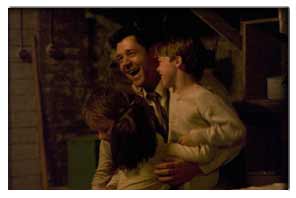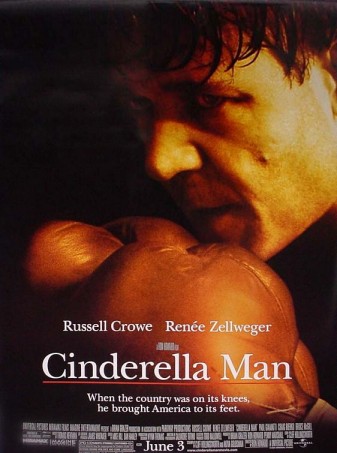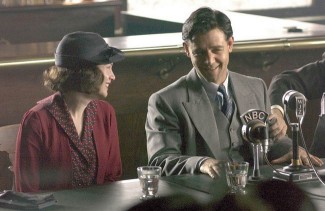|
Cinderella
Man
What is it about the sport of boxing that punctures right
through everything on the surface into the core of human
drama? It could be that we are born to rely solely upon
ourselves. It could also be that our very being depends
on our ability to make something of what was given to us
at birth. Like last year’s phenomenal Million
Dollar Baby, Ron Howard’s latest film tells
a story of a pugilist protagonist who struggles to rise
through the muck of social injustice, but this time during
a little dark corner of American History we like to call
the Great Depression.
Eschewing
the melodic brilliance of Eastwood’s minimalist approach,
Howard’s stance is a bit more traditional, and a bit
more studio in tone. In fact, had this film been produced
at any other time by the studio system, it would likely
be trumped up at yet another slickly produced historical
human interest drama, yet Howard somehow manages to look
past all of this and see the added relevance that this story
packs when paralleled with the fears of today’s economic
climate.
Sure,
we aren’t in the midst of any national crisis, yet.
But discuss economic conditions with any coastal dweller
living in a metropolis of moderate size and chances are
the cost of either a) living, and/or b) gas will be brought
up rather quickly and chances are, a discussion of the job
market and its sagging trends will not be too far in tow.
The
story at hand is that of James Braddock (Russell Crowe),
a boxer who falls on bad times along with everyone else
in the country when the stock market came crashing down.
Braddock had it all, pre-crash, as he was a successful and
undefeated fighter whose earnings had been, at the time,
wisely invested in stocks and bonds. Howard’s hand
is steady as we see Braddock’s family move from a
comfortable upper-middle class lifestyle to the cusp of
skid row. Despite their struggles, Braddock is still fighting.
However, now he is fighting injured, relying on whatever
purse he can scrape up to keep the gas and electric flowing
to the tiny Braddock apartment.
 |
After
a disparaging match, in which both boxers appear to be dancing
for their paychecks rather than actually boxing for title
shots, Braddock is decommissioned, losing any hope for his
family’s survival. Braddock’s stilted match
was largely due to his decision to box with a broken arm,
knowing that his family needed the money more than he needed
to go without further pain. Howard plays these cards well,
and knows that deep down each and every one of us fears
that these days may darken American soil one day in the
near future.
Russell
Crowe, who is either a “take ‘em” or “leave
‘em” actor in my book, manages to pull off the
role in a convincing enough manner. His performance brought
to mind a recent conversation regarding George Clooney.
My brother mentioned that he could care less for Clooney
because he essentially brings the same performance to each
character, at which point he proceeded to do his best Clooney
impersonation, head bob and all. Being a fan of Clooney’s
work this was difficult to understand at first, until watching
Cinderella Man.
Crowe
essentially brings “Crowe” to each role, but
here he surpassed himself, making one forget that “Russell
Crowe” is onscreen and instead sinking into the telling
of Braddock’s struggles to survive during the Great
Depression. He is completely believable as a man who would
rather brutalize himself in the ring then watch as his family
suffers as he fails to get selected for work at the docks
day to day. Renee Zellweger also manages to lose herself
in a role that could easily have been one note in its depiction.
Screenwriters Akiva Goldsman and Cliff Hollingsworth wisely
inject the voices of several wives at crucial points, contradicting
what was once mistaken as idle contentment with the husbands’
choices to physically risk it all with an internal struggle
of mental strain and concern for the well being of their
loved ones.
Visually,
Howard and cinematographer Salvatore Totino manage to find
new ways to make the drama within the ring look anew. Chaotic
and often confusing, the camera tends to look away from
the action, adding a new found frustration to the usual
ebb and flow of filmic ring antics. Usually, the most brutal
blows are rendered in slow motion close-up, just in case
viewers couldn’t make out the contortions of fist-to-face
brutalization occurring with each punch.
The
key difference here is that Totino sometimes pulls the camera
away, just as a vital blow is set to be delivered, and instead
gives us a glimpse of the audience members’ reactions
from a perspective fixed within the ring. This isn’t
a fighter’s viewpoint, mind you, as when the camera
pans back to the action the fighters remain ever engaged
in fisticuffs. This is more like a “ghost’s-eye-view”
of historic events as they occur, and it adds enough spice
to keep us on the edge of our seats.
The
other stylistic improvement upon the fighting sequences
is the attention paid to the action occurring between rounds.
The corner men are often reduced to clichés in films
such as this, offering rigid advice in gravely yells between
rounds. Here we are presented with Joe Gould (Paul Giamatti),
who is in many ways the antithesis of the standard corner
man stereotype. Joe isn’t the derelict guru that was
unearthed from whatever rock he was hiding under, instead
he is a socialite whose prowess in shoehorning talent into
profitable bouts has struggled with the decline in economic
climate, but not so much to send him packing out of his
posh Manhattan apartment. Gould is in good with the big
boys of Madison Square Garden post-crash, and this plays
a larger role in the later acts, as Braddock comes, hat
in hand, asking for a handout for his family’s sake.
After all, he made these men rich in his prime, it should
be a given that they contribute to a relief fund for his
kids.
Giamatti,
once again, offers a performance that is so delicately nuanced
that a nod should be warranted during award season, but
whether he will go on overlooked yet again remains to be
seen. He plays Gould in lush three dimensional tones, and
the arc taken is so well shielded that even the keenest
of eyes will take heart in the outcome.
Rating:

|








